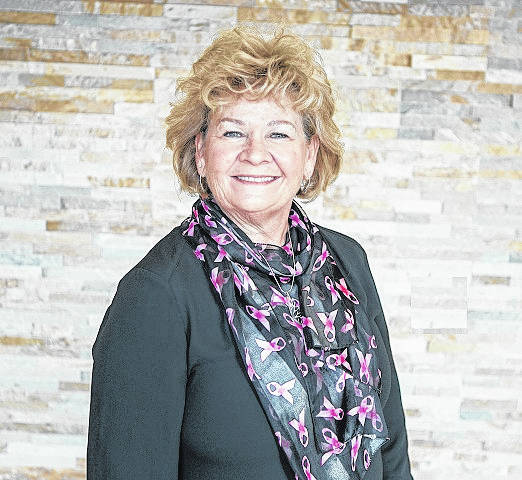
TROY — After more than 30 years of dedicating her life to educating and supporting cancer patients, Jean Heath suddenly found herself on the other side of the table.
The director of Upper Valley Medical Center’s Cancer Care Center was not only a cancer expert; she now was also a cancer patient.
“Cancer doesn’t distinguish between who you are. Just because I am a director of cancer care doesn’t mean I am not getting it,” said Heath, RN, BSN, MA OCN.
A strong advocate of prevention and early detection, she practiced what she preached by undergoing an annual mammogram.
In summer 2015, her routine 3-D mammogram yielded a result that was anything but.
“That was the turning point. My diagnosis was left breast invasive cancer, but it was small and I didn’t feel it,” she recalled. “I tell all women to get a 3-D (mammogram). The pictures are so amazing; it can show so much detail.”
Faced with a number of decisions, Heath turned to local surgeon Dr. Stewart Lowry.
“He is a fantastic surgeon. I trusted him without question. In the wake of my mental storm, he was very calm,” she said. “Even though I considered myself an expert with cancer, it still rocks your world.”
Heath scheduled her surgery and laid out the treatment plan with the assistance of local professionals including the surgeon, radiation oncologist and medical oncologist.
“I had full trust and respect for the doctors, the staff we have here at Upper Valley Medical Center. It never crossed my mind to go elsewhere,” she said.
Following surgery, she underwent 36 radiation treatments at the Cancer Care Center whose expansion she had played an integral part in planning and opening in 2012.
“I was a regular patient with a regular appointment. The staff was very professional, just like they are with everybody. I think seeing me go through it gave them an even stronger sense of their job role, a heightened awareness of how we treat patients,” Heath said.
Dr. Lowry said Heath was a great patient for a nurse “who could easily have questioned anything and everything.”
He said breast cancer care is pretty complicated. “She did ask a lot of good questions, but she did not second guess me or the other specialists involved in her care,” he said.
Dr. Lowry said Heath has “a very good prognosis,” but added she had to have surgery, radiation, and hormone treatments.
“Every test is a new timer that starts ticking when it is ordered or done. When the timer goes off, the light is either green or red. If the light turns green, you just go to the next light,” he said. “She has had all green lights after the first red one. But she can definitely walk the walk of a cancer survivor.”
Following treatment, she has embarked on a five-year plan and is participating in a clinical trial for survivorship monitored locally by Heather Penwell, BSN, RN, UVMC oncology nurse navigator/clinical trials nurse.
“Anything we learn from me or anyone else, others can benefit. Maybe it will help someone else through their journey,” said Heath, who now oversees the Cancer Care Center as part of responsibilities as a UVMC director of nursing.
The experience is a journey, not a sprint, Heath said.
She kept a daily journal of her experiences, as she had encouraged others to do for years. “It is interesting to go back and read what you’ve written in your journal,” she said.
The Premier Health/UVMC affiliation with the MD Anderson Cancer Network is another plus for patients, Heath said. “For our doctors, if there is anything unique or they have a question, they have the top specialists in the world that they can ask a question about my plan of care. We have clinicians and specialists we can call at our fingertips through MD Anderson,” she said.
The MD Anderson standard of care is followed locally including ensuring a short window between the time of cancer discovery, to biopsy, to treatment. “That made a big difference in my state of mind because I knew we were constantly moving toward the journey. I explain this to anyone I am talking to. I tell them, ‘You are not going to be waiting,’” Heath said. The waiting is mentally exhausting, she said.
Her experiences, Heath said, have enhanced her discussions with cancer patients.
“This journey has helped me focus, understand what is important. I can help others, can say ‘I have been through it,’” Heath said. “I can now say, ‘I understand what you are going through.’ To be able to do that, I can help other people to say, ‘I am going to take this journey, and I can do it in a positive way.”


